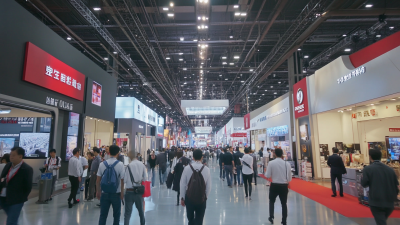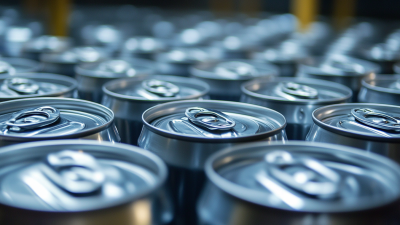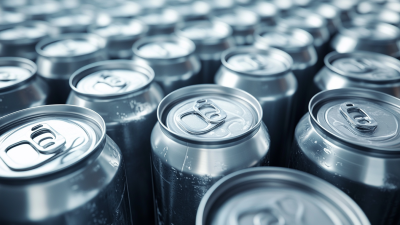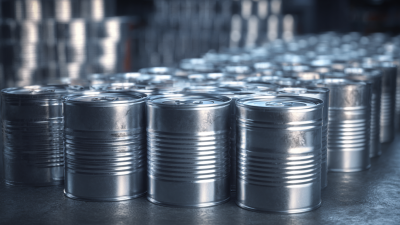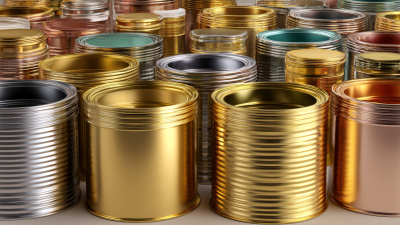 +817089618688
+817089618688
Free Standard Samples can be provided for you to check the quality.
In recent years, metal cans have emerged as a transformative force in the packaging industry, driving innovation and sustainability across various sectors. According to the Freedonia Group, the global metal can market is projected to exceed $30 billion by 2024, propelled by an increasing demand for environmentally friendly packaging solutions that enhance product preservation. As consumers become more eco-conscious, brands are exploring advanced metal can technologies that not only reduce environmental impact but also improve user experience.

This blog will delve into five innovative metal cans that are reshaping packaging solutions worldwide, highlighting how advancements in design, materials, and manufacturing processes are setting new standards for efficiency and sustainability in the market.
 The packaging industry is undergoing a significant transformation as innovative metal can designs emerge to address sustainability concerns. Recent data indicates that the global metal packaging market is projected to grow to approximately $200 billion by 2025, driven by increasing consumer demand for environmentally friendly options. One notable trend is the introduction of lightweight aluminum cans that reduce material usage while maintaining structural integrity. This shift not only lowers carbon emissions during transportation but also increases recyclability, with aluminum able to be recycled indefinitely without loss of quality.
The packaging industry is undergoing a significant transformation as innovative metal can designs emerge to address sustainability concerns. Recent data indicates that the global metal packaging market is projected to grow to approximately $200 billion by 2025, driven by increasing consumer demand for environmentally friendly options. One notable trend is the introduction of lightweight aluminum cans that reduce material usage while maintaining structural integrity. This shift not only lowers carbon emissions during transportation but also increases recyclability, with aluminum able to be recycled indefinitely without loss of quality.
Furthermore, advancements in nanotechnology are playing a pivotal role in enhancing metal can designs. Recent innovations have led to coatings developed through nanoscale materials that improve barrier properties and extend shelf-life, reducing food waste considerably. According to a report by the European Aluminium Association, recycled aluminum can save up to 95% of the energy required to produce new aluminum from bauxite ore, underscoring the importance of utilizing recycled materials in metal can production. As these trends continue to evolve, they promise to reshape not just packaging solutions but also contribute significantly to the broader goals of sustainable development in the manufacturing sector.
Smart metal cans are revolutionizing the packaging industry by integrating advanced technologies that enhance consumer experience. These innovative containers not only provide traditional benefits such as durability and recyclability but also incorporate features like QR codes, NFC chips, and temperature indicators. This allows consumers to interact with products in entirely new ways, from accessing detailed information and promotional offers to ensuring optimal freshness through real-time monitoring.
The use of smart technology in metal cans fosters deeper engagement between brands and consumers. For instance, a beverage can equipped with an NFC chip can direct users to interactive content, providing a story behind the product or suggesting cocktail recipes. Furthermore, temperature-sensitive indicators on cans can alert customers when a drink is at the perfect temperature for consumption. This blend of functionality and user interaction transforms everyday items into dynamic touchpoints, enhancing the overall consumer experience and driving brand loyalty.

As the world grapples with mounting packaging waste and its environmental consequences, innovative solutions are emerging, and metal cans are at the forefront of this transformation. Unlike traditional packaging materials, metal cans are highly recyclable and can be reused multiple times without losing quality. This durability not only extends the life cycle of the product but also significantly reduces the need for raw materials, minimizing the overall environmental impact. Brands adopting metal cans are not just improving their packaging strategies; they are also making a conscious effort to promote sustainability by reducing their carbon footprint.
Furthermore, modern advancements in metal can design and production have made them more versatile and appealing to consumers. The use of lightweight materials and eco-friendly coatings allows for reduced energy consumption during transport, making metal cans an efficient option for both manufacturers and retailers. As companies continue to innovate in this space, the shift towards sustainable packaging solutions, particularly metal cans, reflects a growing awareness of environmental stewardship among consumers. This evolution not only conserves resources but also promotes a circular economy, encouraging more brands to consider metal cans as a long-term solution to packaging waste.
Innovative coatings and finishes for metal cans are not only transforming aesthetics but are also pivotal in enhancing functionality, aligning with global regulatory trends. As consumers become more environmentally conscious, there's a noticeable shift towards materials that minimize ecological footprints. According to recent industry reports, the market for eco-friendly packaging is projected to reach $650 billion by 2027, underscoring the demand for sustainable solutions in the packaging sector.
One notable trend involves the development of coatings that improve the recyclability of metal cans. These advanced formulations reduce the reliance on harmful chemicals, responding to tightening regulations aimed at promoting sustainability. Furthermore, aesthetics play a crucial role in consumer appeal; coatings that allow for vibrant colors and unique finishes are becoming increasingly popular, providing brands with the ability to stand out on crowded store shelves. An eye-catching finish not only attracts consumers but can also enhance the perceived value of the product, with surveys indicating that 70% of buyers are influenced by packaging design in their purchasing decisions.
As we look towards 2025, paint trends spearheaded by innovative technology will revolutionize the packaging landscape, where walls of color are set to breathe life into products. This evolution in metal can design—with a strong focus on both aesthetics and environmental impact—represents a significant leap in the ongoing quest for smarter, more sustainable packaging solutions.
In recent years, the packaging industry has witnessed a significant transformation with the introduction of advanced metal cans. These innovative designs have been successfully implemented across various sectors, reflecting their versatility and sustainability. For instance, the beverage industry has leveraged aluminum cans, which are not only lightweight but also highly recyclable. Coca-Cola's adoption of lightweight can technology has minimized material usage without compromising durability, resulting in a lower carbon footprint and enhanced shelf appeal.
Similarly, the food packaging sector is experiencing a shift towards advanced metal cans that preserve freshness while extending shelf life. Companies like Nestlé have invested in enhanced sealing technologies that prevent contamination and maintain product quality. Additionally, the pet food industry has embraced these innovations, with brands utilizing specialized metal cans that cater to specific nutritional needs while ensuring convenience and safety for pet owners. This cohesive trend toward embracing metal cans showcases how industries are prioritizing sustainability and efficiency, ultimately reshaping packaging solutions on a global scale.

